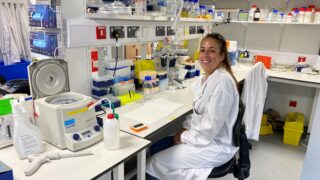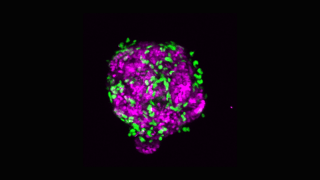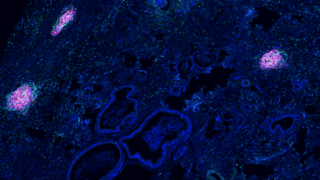Tag: Pancreas
Search News
Categories
Archives
PCRF’s national pancreas tissue bank extends access to precious pancreas samples
26th August 2022
The world’s first national pancreas tissue bank has recently opened its stores to UK-based researchers to access high-quality pancreas samples that will facilitate vital research into improving the diagnosis and treatment of pancreatic cancer.
Read moreBCI researcher receives new Pancreatic Cancer UK Fellowship
20th July 2022
Congratulations to Dr Audrey Lumeau, Postdoctoral Researcher at Barts Cancer Institute, Queen Mary University of London, who has received a Career Foundation Fellowship from the charity Pancreatic Cancer UK to investigate chromosomal instability in pancreatic cancer and its role in therapy resistance.
Read moreStudy suggests simple blood test could help to monitor pancreatic cancer patients
28th April 2022
Researchers from Barts Cancer Institute at Queen Mary University of London have found it is possible to identify and track genetic variations in the tumours of patients with pancreatic cancer using a simple blood test.
Read moreTargeting healthy cells changes invasive behaviour of pancreatic cancer
25th January 2022
Researchers from Barts Cancer Institute at Queen Mary University of London, led by Dr Angus Cameron, have found a way to modulate the invasive behaviour of pancreatic cancer by targeting a non-cancerous cell type found within pancreatic tumours. The findings, published in Cell Reports, provide valuable insights into the biology of pancreatic cancer progression, and could help to drive improvements in cancer treatment.
Read moreOur Pancreatic Cancer Research: From BCI Bench to Bedside
18th November 2021
Pancreatic cancer is a core area of research focus at the Barts Cancer Institute, Queen Mary University of London, with a major aim being direct translation of laboratory research into clinical trials with the hope of improving outcomes for patients. Find out more this World Pancreatic Cancer Day.
Read moreImmune cells assemble – boosting the effects of chemotherapy in pancreatic cancer
9th July 2021
A new study from Barts Cancer Institute, Queen Mary University of London, has demonstrated that immune cells can be stimulated to assemble into special structures within pancreatic cancer such that, at least in a pre-clinical model, researchers can demonstrate an improvement in the efficacy of chemotherapy.
Read more





